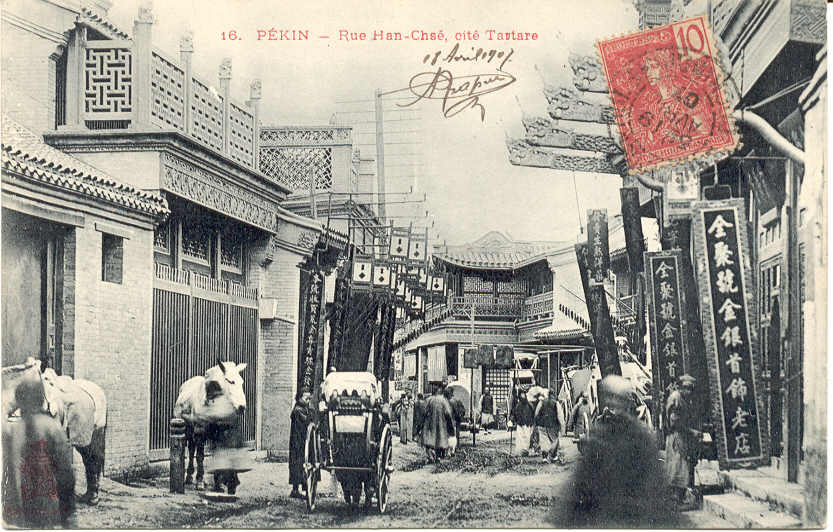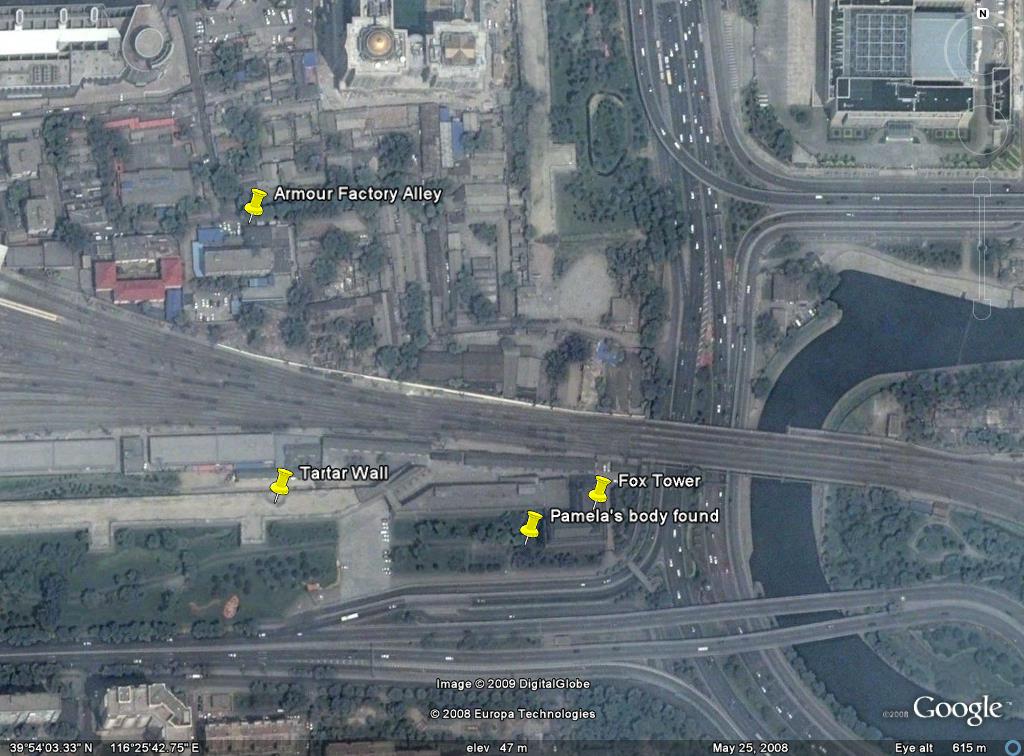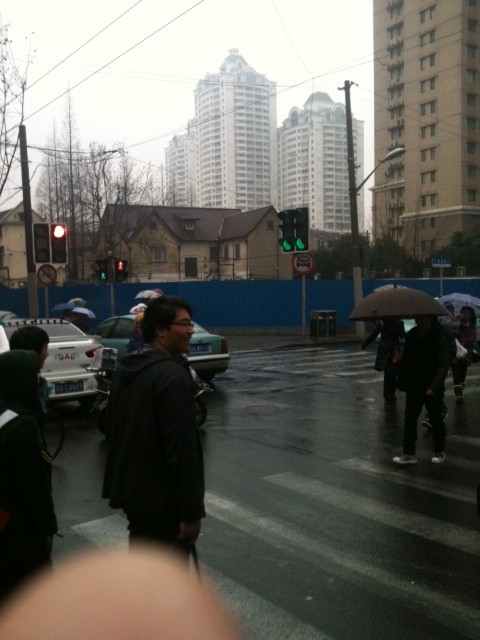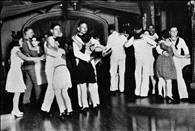Posted: February 14th, 2012 | No Comments »
Today, just a picture postcard from Peking’s Tartar City (Cite Tartare). This card was posted in 1907 so the picture is probably turn of the century or late nineteenth century I suppose. There’s a good lot of detail there to zoom in on.

Posted: February 13th, 2012 | 1 Comment »
I hear there’s a new documentary Assignment: China—”The Week That Changed The World” from director and former CNN Beijing correspondent Mike Chinoy. I don’t know where you can see it – apparently it’s quite funny in parts, not a trait I ever associated with Tricky Dicky but still. Here’s a link to an Asia Society discussion on the film.
 Tricky Dicky meets Murderin’ Mao
Tricky Dicky meets Murderin’ Mao
Posted: February 13th, 2012 | No Comments »
RAS BOOK CLUB
Monday 20th of February, 2012 at 6.30pm
The PuLi Hotel and Spa
1 ChangDe Road, JingAn District, Shanghai
璞麗酒店ä¸å›½ä¸Šæµ·å¸‚é™å®‰åŒºå¸¸å¾·è·¯1å·

The RAS Book Club will meet to discuss NOTHING TO ENVY: Ordinary Lives in North Korea, the author, Barbara Demick will participate in the conversation giving the members the opportunity to discuss the writing, motivations, literary experience and evolution of this book. Entrance: RMB 70.00 (RAS members) and RMB 100.00 (non-members) including a drink (tea, coffee, soft drink, glass of wine). Those unable to make the donation but wishing to attend may contact us for exemption, prior to this RAS Book Club event. Membership applications and membership renewals will be available at these events.
RSVP: bookclub@royalasiaticsociety.org.cn
N.B RESERVATIONS ESSENTIAL AS SPACE IS LIMITED AT THIS EVENT
NOTHING TO ENVY: ORDINARY LIVES IN NORTH KOREA
In NOTHING TO ENVY, Demick follows the lives of six people: a couple of teenaged lovers courting in secret, an idealistic woman doctor, a homeless boy, a model factory worker who loves Kim Il Sung more than her own family and her rebellious daughter. Demick spent six years painstakingly reconstructing life in a city off-limits to outsiders through interviews with defectors, smuggled photographs and videos. The book spans the chaotic years that saw the death of Kim Il-sung, the unchallenged rise to power of his son Kim Jong-il, the devastating effects of a famine that killed an estimated twenty percent of the population, and an increase in illegal defections.
While many books focus on the North Korean nuclear threat, NOTHING TO ENVY is one of the few that dwells on what everyday life is like for ordinary citizens. With remarkable detail, Demick brings to life what it means to be living under the most repressive totalitarian regime in the world today. She gives a portrait as vivid as walking oneself through the darkened streets of North Korea.
Winner of the 2010 BBC Samuel Johnson prize
Barbara Demick has been interviewing North Koreans about their lives since 2001, when she moved to Seoul for the Los Angeles Times. Her reporting on North Korea won the Overseas Press Club award for human rights reporting, the Asia Society’s Osborne Eliott award and the American Academy of Diplomacy’s Arthur Ross Award.    Before joining the Los Angeles Times, she was with the Philadelphia Inquirer as a foreign correspondent in the Middle East and Eastern Europe. She lived in Sarajevo during the war in Bosnia and wrote a book about daily life, Logavina Street: Life and Death in Sarajevo Neighborhood. , Logavina Street: Life and Death in Sarajevo. Her Sarajevo reporting won the George Polk Award, the Robert F. Kennedy Award and was a finalist for the Pulitzer. Demick grew up in Ridgewood, N.J. She is currently the Los Angeles Times’ bureau chief in Beijing.
Posted: February 12th, 2012 | No Comments »
On my website (www.midnightinpeking.com) there’s a walking tour of all the locations from Midnight in Peking – click here – but then I was mucking about on Google Earth – of course the Second Ring Road wasn’t there in 1937 and where the railway runs between the Fox Tower and Armour Factory Alley wasn’t there either and was a silted up part of the Grand Canal complex. Sadly also the Tartar Wall, though you can see part of the last remaining bit of it here, runs out a bit further on as, of course, Mao had it all knocked down.

Posted: February 11th, 2012 | No Comments »
Just a quick note that the third book in my series for Zed Books, Asian Arguments, is now available for pre-order, Thailand’s Hidden Workforce. The book will be available in June. It’s a great subject that has been little reported to date – millions of Burmese women migrate into Thailand each year to form the basis of the Thai agricultural and manufacturing workforce. Un-documented and unregulated, this army of migrant workers constitutes the ultimate “disposable” labour force, enduring grueling working conditions and much aggression from the Thai police and immigration authorities. This insightful book ventures into a part of the global economy rarely witnessed by Western observers. Based on unique empirical research, it provides the reader with a gendered account of the role of women migrant workers in Thailand’s factories and interrogates the ways in which they strategize about their families and their futures.
Ruth Pearson is Professor for Development Studies at the University of Leeds. Kyoko Kusakabe is an Associate Professor of Gender and Development Studies, and Associate Dean of the School of Environment, Resources, Development (SERD), at the Asian Institute of Technology, Thailand.

Posted: February 11th, 2012 | No Comments »
Back in January 2010 I noted the imminent demise of the building on the corner of Shaanxi Road and Nanchang Road (Avenue Roi Albert and Route Dolfus) in the former French Concession. That building has now gone as part of the blanding of the area around the old Xiang Yang Market, now some rather uninteresting tower block offices and the disjointed line 10 bit of the Shaanxi Lu subway station. Let these photos serve notice on the officials, estate agents and naive foreigners in Shanghai who keep telling me that there won’t be any more destruction on the former French Concession – the vandalism goes on pretty much unabated.
Here’s a couple of pictures of the building when it was first being cleared out but was still structurally intact and perfectly suited to restoration and refit
and here’s the empty gap that exists now the building has gone forever….

Posted: February 10th, 2012 | No Comments »
Books on Roosevelt’s Asia-Pacific policy keep on coming – perhaps given the recent imperial adventures of the USA they are finding it instructutive to look back on an earlier time of overseas engagement. Roosevelt of course was deeply involved in the Philippines – what’s interesting about anything on the American occupation of the islands is how many American judges, administrators, consuls, businessmen, whores and gangsters wound up making the jump from Manila to Shanghai in the first years of the twentieth century. They crop uo again and again in Manila and then in Shanghai. So, Gregg Jones’s Honor in the Dust – blurb below as usual.

On the eve of a new century, an up-and-coming Theodore Roosevelt set out to transform the U.S. into a major world power. The Spanish-American War would forever change America’s standing in global affairs, and drive the young nation into its own imperial showdown in the Philippines.
From Admiral George Dewey’s legendary naval victory in Manila Bay to the Rough Riders’ heroic charge up San Juan Hill, from Roosevelt’s rise to the presidency to charges of U.S. military misconduct in the Philippines, Honor in the Dust brilliantly captures an era brimming with American optimism and confidence as the nation expanded its influence abroad.
Posted: February 9th, 2012 | No Comments »
Today, here’s a shot of some American GIs out on the town in Shanghai enjoying a taxi dance!








